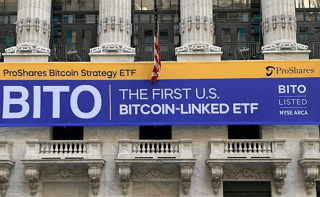A bitcoin ETF is here, and what's you need to know

Bitcoin ETF made news on Tuesday. There have been headlines such as "First Bitcoin ETF Starts Trading" or "First-ever U.S. bitcoin exchange-traded funds (ETF) Launches Today'' or "Bitcoin Comes to the Big Board,"
Before we rush to buy these shares, there are some essential facts you need to know. The newly approved ETF is not what we might think it is.
ProShares Bitcoin Strategy ETF is the ETF at issue. It was approved recently by the U.S. Securities and Exchange Commission (SEC). The ticker symbol of the ETF is BITO.
However, it is not the best way for regular investors to buy bitcoin. This ETF is a bitcoin futures ETF, as the name suggests. It is not a Bitcoin ETF - So, what is the difference?
BITO, a strategy-based ETF, does not purchase and hold bitcoin. BITO does not give investors direct exposure to bitcoin's underlying asset.
The strategy for this ETF is to buy bitcoin futures that trade on the Chicago Mercantile Exchange. This ETF is not intended to be an investment instrument but a trading instrument.
Bitcoin ETF dilemmas
A bitcoin ETF like this has a problem: the underlying asset must be doing well for the ETFs to rise in value. To put it another way, the price of BITO must be rising consistently.
Futures contracts are subject to an expiration date and must be rolled over. As you get closer to the expiration date, your futures contract value will decrease - provided that the underlying asset's price remains constant. The fees for the ETF will rise if you have to keep rolling over futures contracts.
Another problem with the futures strategies is "contango." It is when the futures price for an underlying asset exceeds the spot price. Contango is typical for an asset such as bitcoin, which has a high expectation of rising over time. The problem is that when contango occurs, it usually results in losses in futures ETFs.
Only a few periods in time, bitcoin's price rises quickly enough in the right time-frame to increase the value of futures contracts beyond what it costs to buy them. In other words, bitcoin can grow, and we still can lose money in this bitcoin ETF.
All of us wanted an ETF that could hold and custody bitcoin. This would have made it easy for investors to access this exciting asset class. The SEC has given us a highly risky ETF that is accessible to all, but which very few people will understand and in which most investors will lose their money.
Gary Gensler (chair of the SEC) virtue signals that he is trying to protect everyday investors. This is why an ordinary bitcoin ETF was not approved. Yet, the approval of BITO did precisely the opposite.
I am humbled to say that unless you can accurately time the bitcoin markets and understand how futures strategies work, I advise against this bitcoin ETF.
Anyone can get exposure to bitcoin by simply purchasing it on an exchange such as Kraken or Coinbase or via PayPal, your Cash App.
This article was printed from TradingSig.com